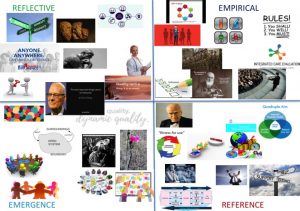In literature about Total Quality Management (TQM) we find lots of definitions. A literature review by Miller (1996) ended up with the following definition: TQM is “an ongoing process whereby top management takes whatever steps necessary to enable everyone in the organization in the course of performing all duties to establish and achieve standards which meet or exceed the needs and expectations of their customers, both external and internal”. The concept of totality is expressed by the words “everyone in the organisation”. That idea got much support by quality gurus like Deming, Juran, Crosby, Feigenbaum and Imai. I would be the last to argue against quality experts like this. And I do agree that it is crucial that everyone in the organisation is involved in quality management. Like Imai says, Kaizen is everyone, everywhere, every moment improvement.
However there is another valid explanation for the concept of totality in TQM: the one of a totality of the different paradigms as discussed earlier in posts 5 and 9 on this website. Kemenade and Hardjono (2018) discern 4 paradigms, that can be combined in the R2E2-Model(c): the Reflective paradigm, the Reference paradigm, the Empirical paradigm and the Emergence paradigm. Total Quality Management in that sense means that one has the flexibility to use different paradigms and their concepts, models and tools in different contexts.

Actually we are talking about epistemic fluency. Epistemic fluency is mentioned by Markauskaite and Goodyear (2016) as the capacity to understand, switch between and combine different kinds of knowledge and different ways of knowing about the world. They state that “Working on real-world problems usually requires the combination of different kinds of specialised and context-dependent knowledge, as well as different ways of knowing. People who are flexible and adept with respect to different ways of knowing about the world can be said to possess epistemic fluency.” If we talk about an organization that would mean Total Quality Management.
References
Kemenade, E.A. & Hardjono, T.W. (2018) Twenty first century Total Quality Management: the Emergence paradigm, Total Quality Management Journal, under re-review
Markauskaite, L., & Goodyear, P. (2016). Epistemic fluency and professional education: innovation, knowledgeable action and actionable knowledge. Dordrecht: Springer.
Miller, W.J. (1996) , Working definition of total quality management, Journal of Quality Management, Vol 1, No 2, 149-159

